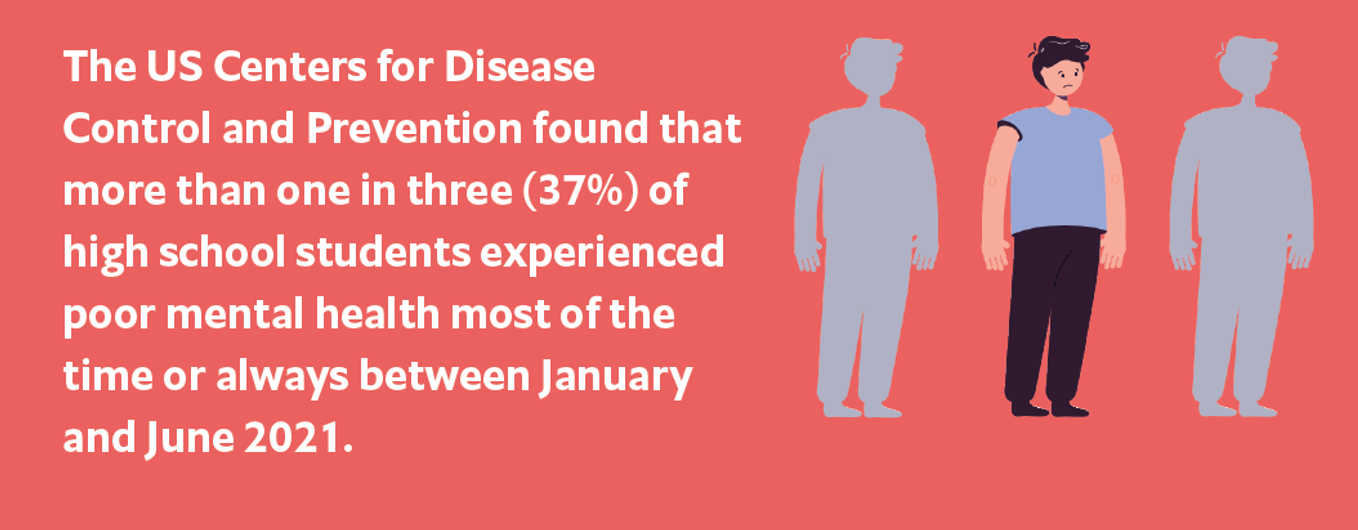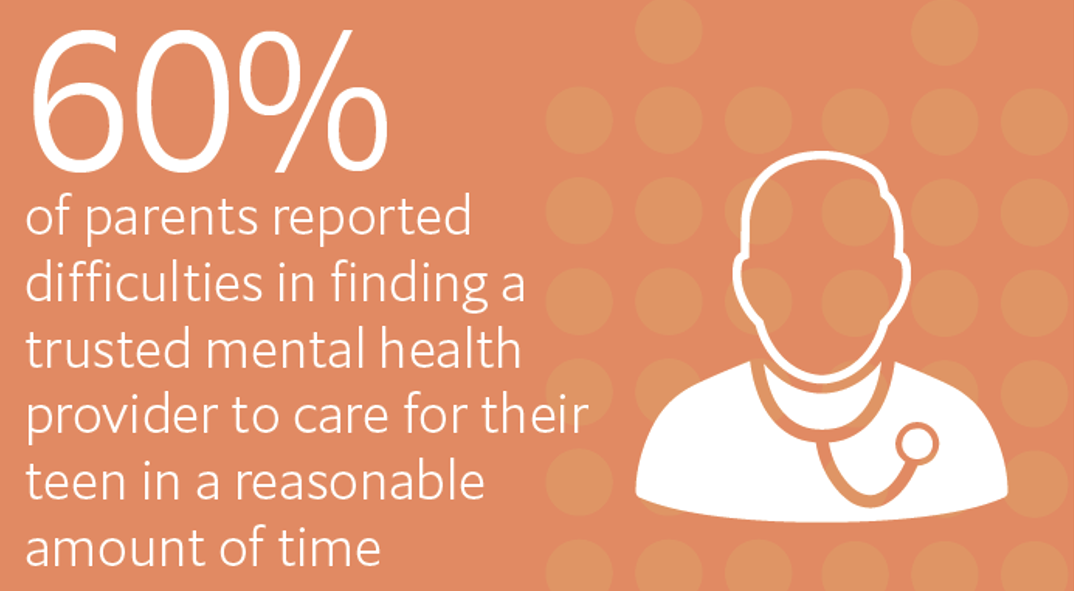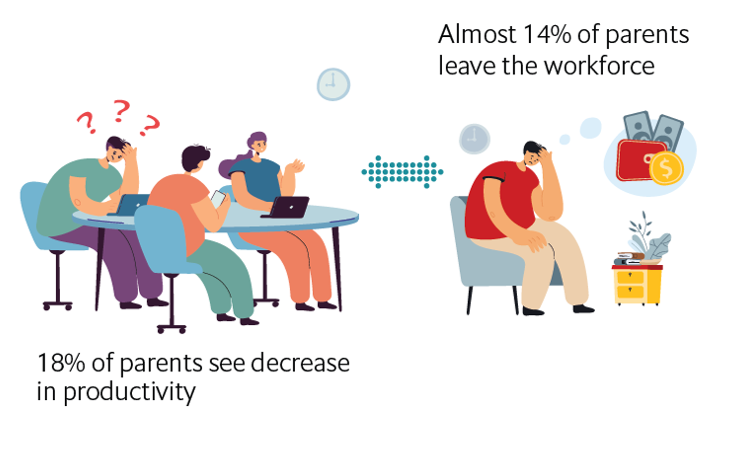Th effects of the pandemic on teenage mental health is putting overwhelming demands on working parents, according to new research by Economist Impact, which was commissioned by Cigna.

The number of teenagers facing mental health issues has been rising every year, and the recent upheavals in their lives due to COVID-19 had boosted that number to dramatic heights. This sudden effect of the pandemic on teenage emotional health is putting overwhelming demands on parents, making a distressing impact on life at home as well as at work. Nearly one-fifth (18%) of working parents report that their teenager’s emotional state has a negative impact on their job performance and productivity, according to a new survey from Economist Impact, commissioned by Cigna Corporation and Evernorth, its health services business. More than half (55%) of these concerned parents report not having enough support from their employer, and one in seven employees report having to leave the workforce or stay out of the workforce to care for their teenagers’ needs.
Even before the COVID-19 pandemic, many teenagers were struggling with their emotional well-being. Research has shown that more teenagers have been experiencing mental health issues over the past decade. Having a child in such a crisis can be emotionally overwhelming for parents, and can affect their attitude toward work as well as their level of energy and availability on the job.
COVID-19 has significantly exacerbated this problem. One global study found that youth depressive and anxiety symptoms doubled during the pandemic, with 25% of youth experiencing depressive symptoms and 20% experiencing anxiety symptoms. Emergency department visits by adolescents aged 12 to 17 for mental health reasons increased by 31% in 2020 compared to 2019. Such visits related to suspected suicide attempts were 51% higher for adolescent girls and 4% higher for adolescent boys in early 2021, compared to the same time period in early 2019.
Cigna has noted a 25% increase in non-pharmacy behavioral health care spend in 2021 over 2020 among covered teenagers ages 13 to 19. The organization also observed a 13% increase in teenage antidepressant prescriptions during this time, with nearly twice as many teenage girls taking antidepressants as teenage boys.
Increasing teenage mental health struggles can rapidly become a growing workforce issue. To better understand the mental health impacts of the pandemic on this particular age group, as well as the effect on both the home and work lives of their parents, Cigna Corporation and Evernorth commissioned Economist Impact to conduct a survey of 1,100 U.S. parents of teenagers aged 13-17 in April 2022. Cigna Corporation Chairman and CEO David Cordani will discuss this teen mental health issue, and unveil how Cigna is making behavioral health care and resources more accessible to both teens and their parents, during a fireside chat at the Fortune Brainstorm Health Conference in Los Angeles, CA.

Mental Health Impacts of the Pandemic on Teens
New research by the Economist, commissioned by Cigna, has found that the increase in mental health issues among teens is having an impact on their parents at home and in the workplace.
The Turmoil of the Past Two Years
Approximately 80% of working parents surveyed reported some form of impact on the mental health of their teenage children as a result of the pandemic, including new or increased levels of anxiety, depression, behavioral issues, and problems with social interactions.
Mental health impacts on teenage children during the pandemic (reported by working parents surveyed)
- New or increased anxiety: 39%
- New or increased problems with social interactions (e.g., withdrawing from friends or family): 34%
- New or worsened irritability or behavioral problems: 24%
- New or worsened depression: 23%
Alarmingly, some parents also reported an increase in teenage substance use, mental illness diagnoses, self-harm behaviors, and suicidal thoughts. Although the number of parents reporting these incidents is smaller, these increases are a sign of serious emerging mental health issues that need to be addressed.
Mental health impacts on teenage children during the pandemic (reported by working parents surveyed)
- New or increased use of addictive substances (e.g., drugs and/or alcohol): 10%
- New or worsened diagnosis of mental illness (e.g., schizophrenia, etc.): 9%
- New or increased self-harm behaviors: 9%
- New or increased suicidal thoughts: 8%
Teen Mental Health Challenges Unsettle Their Parents’ Lives and Well-being
A number of parents reported feeling overwhelmed by the demands of their teenagers with mental health issues. Many reported increased stress about finances, increased tension with their partner, and concerns about neglecting other children in the family.
Challenges working parents experienced because of their teen’s mental health
- Feeling overwhelmed by my child’s needs: 27%
- Negative impact on my own mental health: 31%
- Increased general stress around finances: 33%
- Increased tension between myself and my spouse/partner: 24%
- The impact on my child’s siblings and my ability to care for them: 16%
While these working parents recognize the negative impact on their mental well-being, their struggling teen is naturally a top priority. So, it is very likely that these parents are not sufficiently taking care of their own mental health.
Even the attempts to seek proper help for their teen can be a challenge in itself, which increases the emotional turmoil for working parents.
Barriers faced by working parents to getting their teen help for their mental health issues
- Difficulty finding a trusted mental health provider for my child: 64%
- Delays or long wait times: 63%
- Challenges paying for mental health services: 57%
Challenges at Home Extend to the Workplace
Parents preoccupied with their teens’ mental health struggles end up struggling themselves on the job. Roughly 18% of working parents surveyed noted a negative impact on their work performance and output. Nearly 14% of all respondents stated they had to leave or stay out of the workforce completely in order to better care for their teens. This all adds up to a substantial loss of productivity in the workplace.
Compounding the problem is a perceived lack of employer support. A majority of parents (55%) feel that they do not have enough support from their employer, in regards to offering flexible work schedules to attend appointments or deal with emergencies. To these employees, work is an additional barrier to getting their teens the help they need — which can negatively impact their feelings toward work and their engagement on the job.
Many working parents are also challenged by even asking employers for support. Stigma is still a significant issue, as 44% of parents reported feeling embarrassed or ashamed about their teen needing mental health services.
What Employers Can Do to Support Working Parents
As their teenage children are coping with the difficulties of these troubled times, employees may be challenged to take care of themselves while doing their job. Employers can help support workers while strengthening emotional health in their organization. Here are some starting strategies to consider.
Foster a business culture that values mental health. Setting a tone of compassion and destigmatizing mental health conditions (such as stress, anxiety and depression) can help make employees of teens struggling with such issues feel more comfortable asking their managers or team leaders for support. Encourage senior leaders to share their experiences in maintaining their mental health. Educate middle managers to help them be more confident in discussing emotional well-being with their direct reports (employee assistance programs typically offer management training seminars on mental health topics). Establishing employee resource groups on mental health and parenting topics can also help provide support and strengthen connections at work.
Make accommodations. Increased flexibility in work schedules or temporary work-from-home arrangements can help parents that need to juggle their job with phone calls with treatment specialists, therapy appointments, and school meetings which all typically take place during office hours. Almost two-thirds (63%) of parents agree that flexible work arrangements would allow them to better manage their teen’s mental health concerns. Business leaders should check their company’s policies to see what flexible accommodations can be offered. Whatever the arrangement, it is important that the employee is clear about the work expected to be accomplished during this time. The duration and outcomes of mental health treatment can be difficult to predict, so team leaders should check in with the parent from time to time to see how they are doing, and whether any further adjustments or accommodations are needed.
Connect them to benefits and resources. Make sure employees know about available benefits and programs that can help both their teens and themselves. These can include counseling services via an employee assistance program and more comprehensive behavioral health care through the company’s health plan, including options to connect with a mental health professional virtually.

Helpful Resources
Cigna customers have access to wide range of resources to help teenagers and their families, including an extensive behavioral network that includes providers who offer virtual services for teenagers, such as MDLIVE and Talkspace, digital support through iPrevail, and caregiver services to support parents.
Evernorth Behavioral Health partners with Cigna and other health plans and employers to match the right solutions to their members’ unique needs.
Product availability may vary by location and plan type and is subject to change.
Online wellness, mental health and behavioral resources are available to anyone at Cigna’s COVID-19 Resource Center. Click here to learn more.


